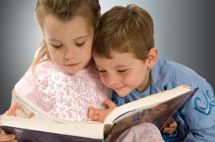Занятия по русскому языку для 1 класса
Class 1 - the most important stage in the life of the family
New status - student - new important responsibilities of the student. During this period it laid the basis for further successful learning. The way a child learns to read and write this year will depend in the future and the pace and quality of jobs in other subjects, the pace of work in the classroom and at home, as a whole - the success of the further assimilation of the Russian language
.
What should be emphasized in this year to form a solid basis for the further path in the world of new knowledge.
We distinguish three components:
The first half
As a rule, the guys in the class are at different stages of exploring the reading process. And those who are just beginning to read, and those who already have the first successes in this matter, need extra classes, required reading practice. No extracurricular activities can not do.
The child is already reading
If your child is already reading, it will be enough to buy a book that will interest your child. It is best to carry out a joint campaign in the bookstore, it is unlikely you will be able to get away from it with a book. With great pleasure the child will read a book, chosen by himself, which interested him.
The child is just beginning to read
If your child is just starting to read it without the aid can not do. Parents should be patient and to provide classes for reading at least 30 minutes a day every day. If the process is slow and the child does not show much interest in reading, it is necessary to think about the extra-curricular activities on the Russian language for the 1st class.
Difficulties with reading
If the child confuses letters, reverses letters, syllables, does not feel the stresses, should consult a speech therapist may require special exercises.
If the child has mastered the first steps of the process of reading: it is easy to read by syllables simple words on the structure, but to push it to the future success does not work, it will help such training program that will interest the child reading, offer simple but effective methods of use reading techniques. Entice fun activities so that this painstaking process will bring pleasure to the child. Then the result will not take long.
The teachers Educational Center "Aristotle" developed specialized programs extracurricular activities on the Russian language. One of them is "Reading with love", allowing fast enough to accelerate the process of improving reading skills, as it is technically and quality.
Graphic skill
In recent years, significantly reduced the time it devoted to stage hands, forming neat clear handwriting. Graphical elements, which letter is constructed in practice, is not practiced sufficiently. So the recipe for additional extracurricular activities at home are likely to be needed. It is possible to consult in advance with the teacher on the subject.
Basics letters
Letter - a complex, multi-step process that requires the student sustained visual and auditory attention, the rapid switching of developed memory, phonemic perception formed. All these components require additional reinforcement training.
Timely support will reduce the possibility of the following errors: missing letters, trespass offerings, mixing similar sounding, the external similarity of letters, errors refer to mitigate the consonants on the letter and other difficulties. Every year the volume of jobs will increase, less and less time and opportunity to the boys for further elaboration and consolidation of the individual components of the writing process.
What is the result
Educational center "Aristotle" offers extra-curricular activities on the Russian language for students of class 1 according to the program "Introduction to Gramoteykoy". Classes are aimed at developing the basic components necessary for successful writing:
- development of phonemic perception;
- a sense of language units;
- word-building skills;
- an increase in the active vocabulary;
- the practical testing of the starting spell for Grade 1;
- consolidation of visual, graphic, kinetic images of letters;
- interest in the native language.






